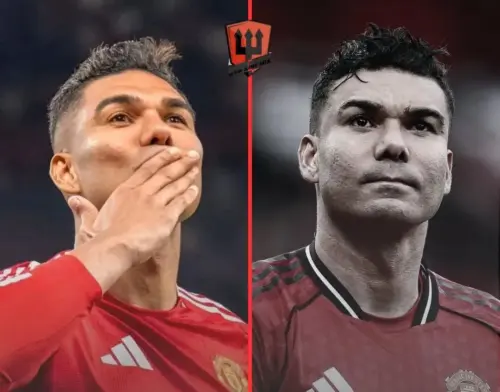
Just as the intensity of a BD Cricket Match can shift momentum in an instant, Manchester United’s relationship with Casemiro has turned from uncertain to indispensable — and now, perhaps, back toward uncertainty again. Once sidelined and rumored to be leaving, the Brazilian veteran has clawed his way back into the heart of the team with sheer determination and experience. In United’s recent 4-2 victory over Brighton, the 33-year-old midfielder produced a vintage display, scoring and assisting to lead the Red Devils to an important win. The crowd at Old Trafford roared his name so loudly that, as English media poetically put it, the sound seemed to ripple across the nearby River Irwell.
Under manager Rúben Amorim, Casemiro’s story has been one of quiet redemption. Earlier this season, after the 0-2 home defeat to Newcastle, he had nearly vanished from Amorim’s plans. United were even willing to sell him, desperate to offload his hefty wages. But Casemiro refused to give in. He trained harder, fought for minutes, and slowly regained the manager’s trust. His resurgence has been so convincing that Amorim publicly praised him after the Brighton win, calling him “a model of professionalism” and noting how his leadership and discipline have lifted the squad. Statistically, the difference is undeniable: United have conceded just three goals with Casemiro on the pitch this season, compared to thirteen without him. When he plays, the team looks organized; when he doesn’t, chaos creeps in.
Still, the club’s management has made up its mind. According to Football Insider, Manchester United will not trigger the one-year extension clause in Casemiro’s contract. Sir Jim Ratcliffe and the INEOS sporting department believe renewing him beyond next summer would not be financially sensible. Casemiro turns 34 in February and is one of only three players at the club earning over £300,000 a week — a figure that would climb to £350,000 if United qualify for next season’s Champions League. If he wishes to stay, a massive pay cut will be unavoidable.
Amorim values Casemiro’s game-reading and positional intelligence, but the physical demands of the Premier League are catching up. Even in a season without European competitions, he has yet to complete a full 90-minute match. Five yellow cards in nine games, including a red against Chelsea, reveal a player who sometimes fouls simply because his legs no longer move fast enough. United’s coaching staff know that his awareness remains world-class, yet they also see the limits — he can no longer cover ground like he once did at Real Madrid.
In contrast, the new recruits such as Matheus Cunha, Bryan Mbeumo, and Benjamin Šeško earn less than half of Casemiro’s current salary. From a business standpoint, the decision makes sense. The club is building for the future, not the past. But emotionally, it’s a harder pill to swallow. The difference between United with Casemiro and without him feels as wide as night and day, particularly in defensive stability. When he plays, they look like contenders again. When he sits, they look lost.
BD Cricket Match fans would recognize this rhythm — the veteran who still controls the tempo but knows time is closing in. Casemiro’s case mirrors that bittersweet phase in every athlete’s career when legacy meets reality. Come January, he’ll be free to negotiate with clubs abroad or accept a wage reduction of over 50 percent to stay. Whether he chooses to chase one final challenge or remain at Old Trafford on new terms, one truth stands: his fightback this season has already reminded Manchester what true leadership looks like, even as the clock ticks toward change.
